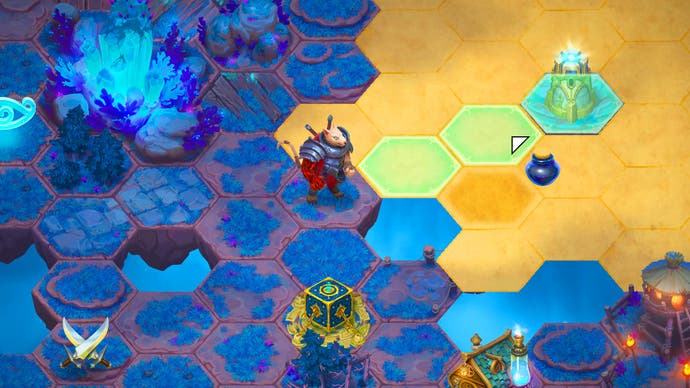Roguebook throws the book at card games and roguelites
A couple of mornings with this delightful CCG.
An old Edge editorial that has stayed with me spoke about what a perfect piece of technology a book is. I think Getting Up had just come out, with its luxuriously muddled menu systems based on the New York subway system. Anyway, compared to picking your way through that, a book is just a treat. Open it up and everything's right there on the page.
No wonder certain games love books so much. In the past few years we've had Trials of Fire, a sublime turn-based battler that uses a book for just about everything, and here's Roguebook, freshly released on consoles, in which the whole adventure plays out with a bunch of heroes trapped in a book.
I have spent a few mornings with Roguebook and I don't particularly want to escape. This is a collaboration between the people who made the digital card game Faeria and Richard Garfield, of Magic: The Gathering. It's a roguelite collectible card game which, in the present day, doesn't really tell you much. But it's a genuinely lovely thing - precise and playful by turns. It has chunky fairy tale art, delightful systems and a secretly dashing font - I'll leave you to decide which one, because annoyingly it uses several. It might be love!
Anyway, there you are stuck in the pages of a magical book. Each chapter plays out on a single sheet, in which you move across hexes - hexes! This game truly has everything - and spend a limited pool of ink revealing more of the map. The aim is to become powerful enough to defeat the page's boss, at which point you move on.
Becoming powerful enough is quite tricky at first. There are points on the map where you can get new cards, but there are also spots where you might find coins or something else useful. Ink is in short supply and the page is very big, so it's always a bit of a gamble.
The heart of the game is the battle system, though, which sees you controlling two characters and their growing pool of cards, generally split between defensive and offensive abilities. Managing defense is crucial, because your health isn't topped up between battles, but you also have to think about placement, with some cards re-arranging the order of your two heroes, and some cards requiring certain heroes to be in certain positions to get perks.
What marks Roguebook out for me, even at such an early stage, is how many of these battles can feel like puzzles. Just now I had an enemy at the back who could conjure new enemies that stood in front of them. How to get through the new fodder and reach the guy who was doing all the conjuring?
Roguebook is like this: it teaches you the rules, and then it does something tricksy with them. It's lovely to see this much imagination and wit in such a busy genre. Just as it's lovely to lose a few mornings to something that is familiar and surprising by turn.


